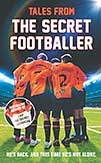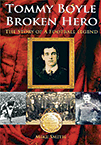 by The Secret Footballer
by The Secret Footballer
Guardian Faber, £12.99
Reviewed by John Earls
From WSC 328 June 2014
At the end of 2012’s entertaining first volume, the Secret Footballer (TSF) was binge-eating in a deliberate attempt to end his career. Nearly 18 months later he’s still playing, although the nature of his increasingly tiresome secret identity means it’s hard to gauge at what level. This time round, he’s still trying to fathom an alternative career, but his loathing of football’s machinations is making it hard to pick one.
It’s tricky to work out who TSF has most contempt for. He dismisses fans for being clueless about what really goes on in football (ironic, as his previous book was marketed as letting us rubes acquire such insider knowledge). But he also wants to avoid managing, as that involves dealing with annoying players who need constant mollycoddling “like me”. Yet the book is at its best when discussing coaching, as our man eloquently explains various tactics while taking his badges. A section on the FA’s centre of excellence is also revealing – it’s superbly stocked but effectively useless as poor design means physios can’t actually see injured players using the equipment.
Such nuggets mean it hurries along and mostly avoids feeling like offcuts not good enough for the first book, bar a pointless chapter on why his favourite player is Paul Gascoigne. Fairly conclusive evidence shortly before publication appeared to reveal TSF is Dave Kitson. So you feel conflicted when reading about an inept chairman trying to get players to waive their wages, wondering which of Kitson’s clubs it’s referring to. Or is it not Kitson, and we’re unfair in assuming it’s Portsmouth?
There is more about TSF’s personal life than before, but his vague identity means it’s hard to care about a relatively routine teenage MDMA comedown when you don’t know who’s enduring it. Whoever TSF is, he comes across as more boorish than the first book’s apparently cultured aesthete. A tale about crashing a yacht with four newly met women on board is told in a spirit of laddish high-jinx, but is as crass and misogynistic as anything TSF’s nemesis Ashley Cole could create. Nor do constant moans about paying tax make the reader think the author could be mistaken for Noam Chomsky. Every moving passage about depression is countered by one leering at players cheating on their partners. It would have been a more effective book if TSF had dropped the S, stopped trying to be a Popbitch-style nark and gone into more detail about his complex attitudes to football and his own driven nature.
If you’re after further gossipy froth such as the League Two club who cry poverty every close season yet pay their manager three times more than the rest of the division, then TSF has triumphed again. But this book’s main aftertaste is one of unease. This self-entitled author feels too liberal to bond with most of his fellow players, which paints a more undernourished image of football’s culture than any number of tabloid splashes.
 The story of a football legend
The story of a football legend
